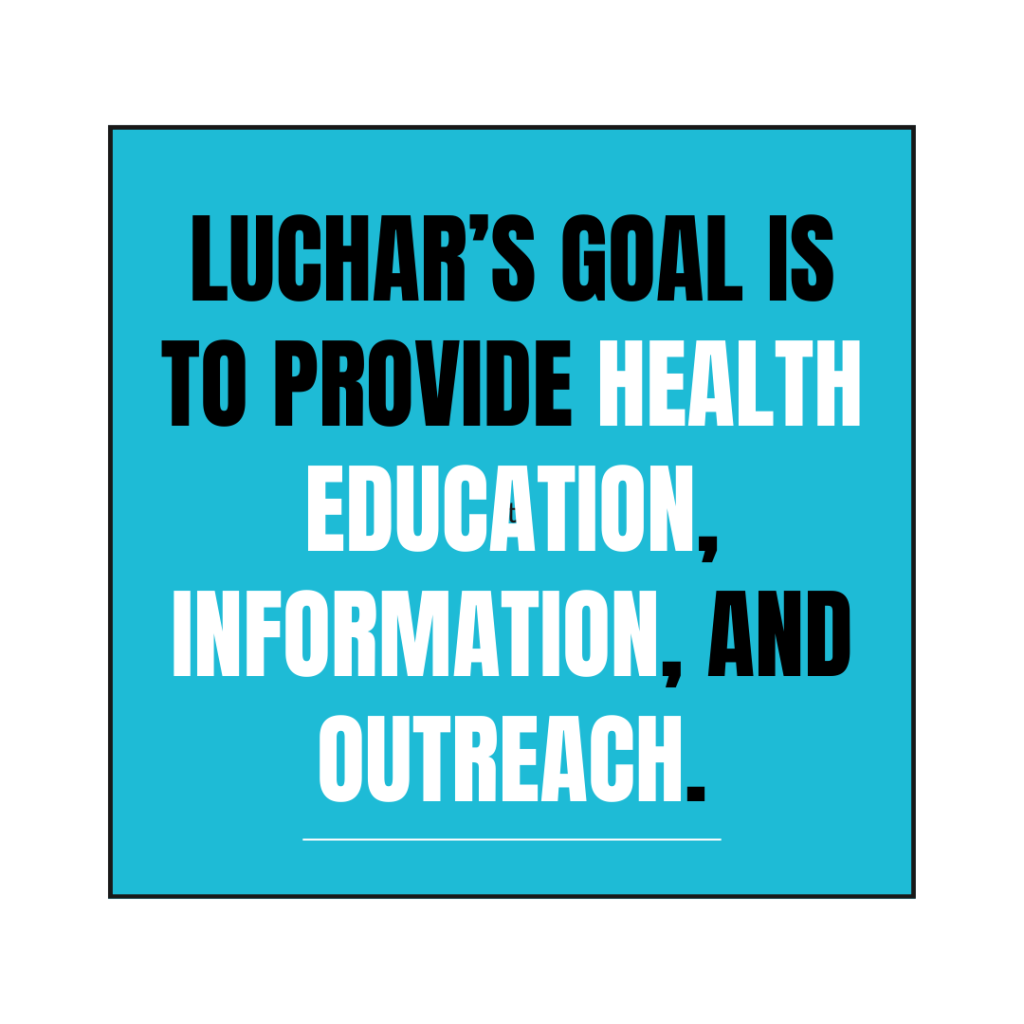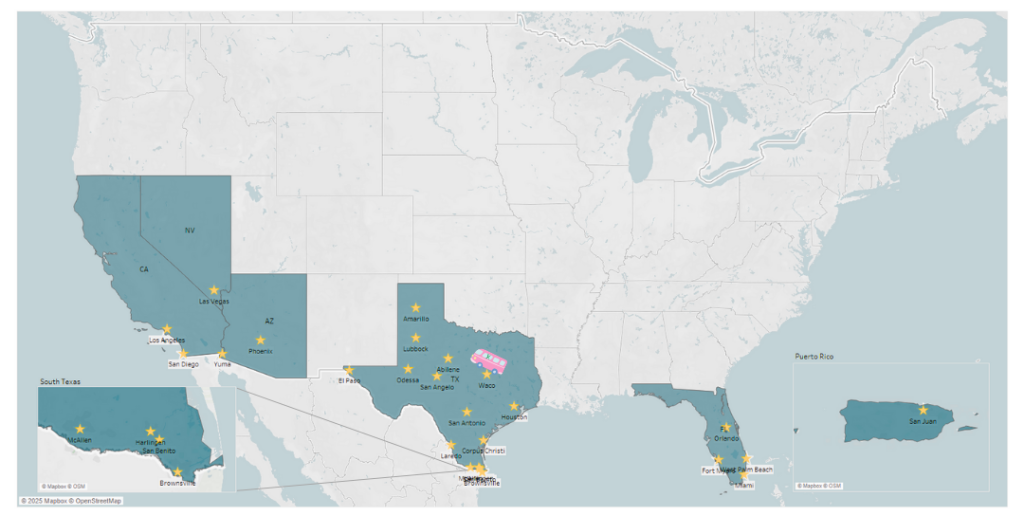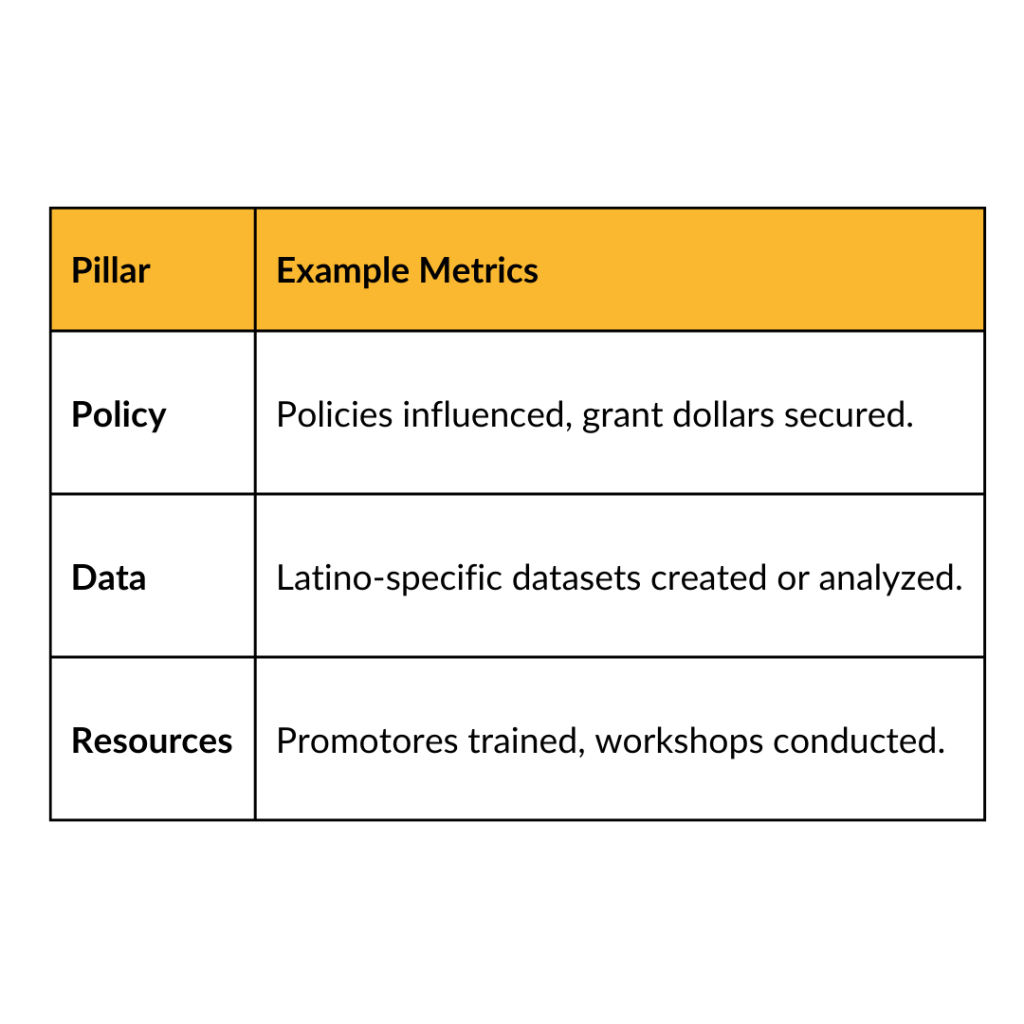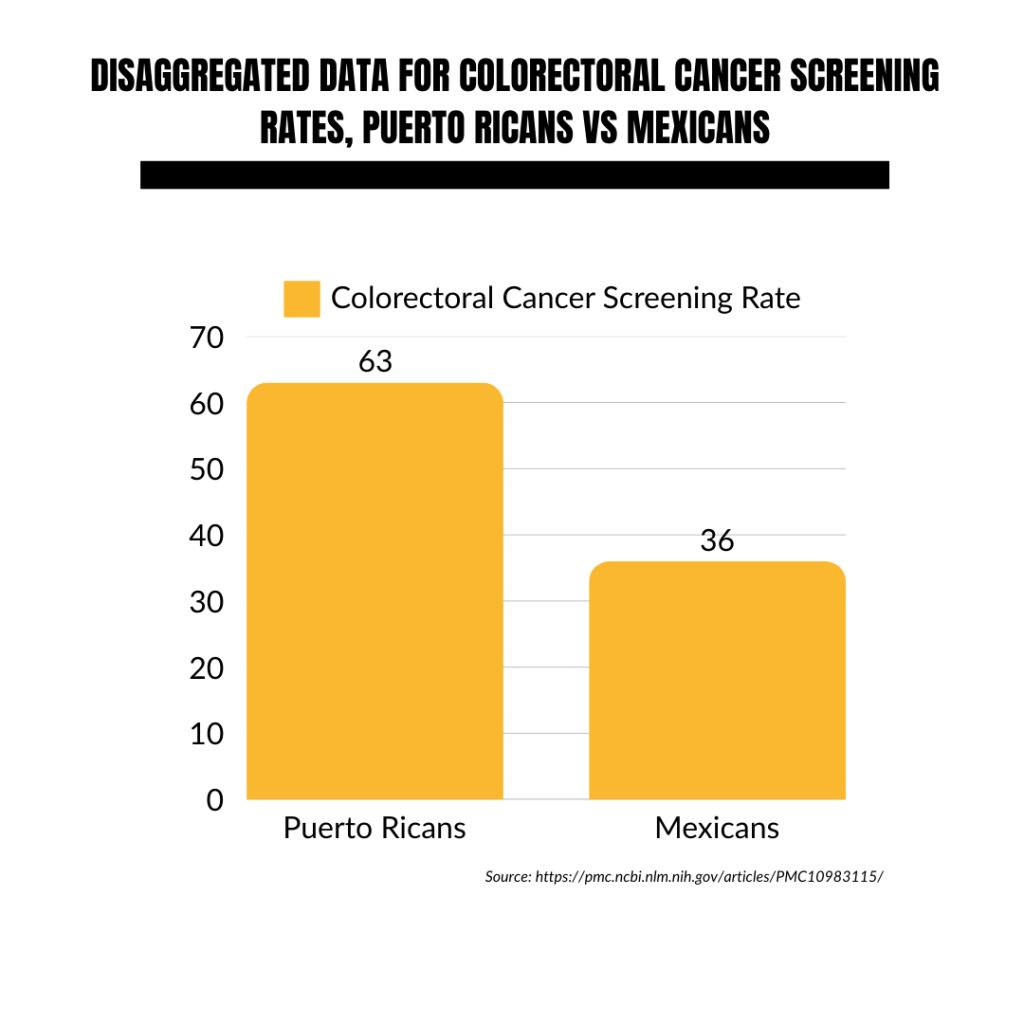WHAT IS LUCHAR HEALTH?
Empowering Latino communities through culturally tailored health solutions.
Inception of LUCHAR
The Latinx Task Force was established in March 2020 in response to the COVID-19 pandemic. Its mission was clear: to champion Latino health equity through targeted interventions and partnerships that address gaps in healthcare access for Latino communities, families, and workers.
LUCHAR (Leading and Uniting Comunidades through Health and Awareness Resources) is a comprehensive health initiative born from the Latinx Task Force. Focused on addressing health disparities in Latino communities, LUCHAR operates through three core pillars: education, advocacy, and outreach—delivering culturally relevant health solutions.
From the start, LUCHAR has been guided by the stories and lived experiences of Latino communities. These narratives not only shaped the program’s priorities but also highlighted the diverse challenges and strengths within our communities.
By fostering collaboration with community partners, LUCHAR ensures its strategies are sustainable, culturally responsive, and inclusive of the diverse languages and identities across Latino communities in the United States. Our mission is to advance lasting health equity by providing actionable insights, empowering communities, and amplifying Latino voices.

LUCHAR serves two main purposes:
- To act as a resource for partners and decision-makers, providing actionable insights and tools.
- To be a resource hub for families, offering free resources and easy-to-navigate health information.

History of LUCHAR
Timeline
- 2020: The Latinx Task Force was established in response to the COVID-19 pandemic, with the goal of addressing health disparities in Latino communities through targeted interventions and partnerships.
- 2021: Strengthened collaborations with key partners nationwide to address the evolving needs of Latino families, focusing on health equity, education, and access.

2022: Partnered with the Health Communications Network and the U.S. Department of Health and Human Services (HHS) to launch the Juntos Sí Podemos Campaign and the Latinx Boost Up Tour, promoting COVID-19 health education and community outreach.
2023: Insights from community stories, research, and local expertise were analyzed and distilled into thematic health priorities. These became the foundation for LUCHAR Health, officially launched in September 2023—a platform designed to amplify partner voices and center community-driven stories.
2024: Focused on the development of a robust framework for LUCHAR Health, addressing 14 key health topics and implementing 4 strategic pillars to strengthen the initiative’s impact in 2025 and beyond.
This tour spanned 25 cities, where we held over 175 meetings, organized over 100 events and pláticas, and conducted more than 125 interviews to capture community stories. Through these efforts, we disseminated over 50,000 bilingual educational materials and established partnerships with over 150 health-specific organizations and 75 arts/small business sectors. And over 5 million families were reached.


Why LUCHAR?
LUCHAR exists to address critical health disparities faced by Latino communities in the U.S. The COVID-19 pandemic highlighted systemic inequities, and while temporary measures were implemented during the crisis, sustained and culturally competent solutions are still urgently needed.
Key Reasons for LUCHAR’s Existence:
- Health Disparities: Latinos continue to experience significant barriers in healthcare access, affordability, and quality.
- Cultural Relevance: Many health initiatives overlook the cultural and linguistic nuances vital to effective outreach in Latino communities.
- Community-Driven Solutions: LUCHAR focuses on empowering local communities by collaborating with trusted messengers and promotores.
Overview of LUCHAR’s Foundation
LUCHAR’s success is built on three foundational elements: partnerships, language, and culture. These pillars strengthen LUCHAR’s ability to create sustainable and culturally relevant health initiatives.
Partnerships: The Foundation of Collaboration
LUCHAR collaborates with local, state, and national organizations to enhance outreach, build trust, and increase the impact of its programs.
“No single organization can do it all—collaboration is key to sustainable change.”
Language: Addressing Linguistic Diversity
Language remains a significant barrier for many Latino communities. LUCHAR addresses this challenge by:
- Translating materials into regionally appropriate Spanish.
- Recognizing dialectal differences among Latino subgroups.
- Ensuring linguistic diversity is a central component of health initiatives.
Culture: Tailored Approaches for Latino Communities
Cultural relevance is critical to LUCHAR’s approach. By integrating cultural understanding into its programs, LUCHAR aims to:
- Build trust with diverse Latino communities.
- Tailor outreach to reflect community values and traditions.
- Amplify cultural strengths as a foundation for health equity.
Policy, Data, and Resources Section
LUCHAR is built on three core pillars essential for addressing health disparities and driving sustainable health equity: Policy, Data, and Resources.
Policy: Transforming Structural Barriers
Policy influences every aspect of health equity. LUCHAR advocates for systemic changes that benefit Latino communities, such as increased funding, better infrastructure, and workforce availability.
Data: Building the Foundation for Change
Data-driven strategies are key to LUCHAR’s success. The initiative focuses on collecting and analyzing Latino-specific data to inform interventions and policy decisions.
Resources: Sustaining Health Equity
LUCHAR connects communities with vital resources, including funding opportunities and promotores-led programs, ensuring health initiatives remain impactful.


As a resource hub, LUCHAR equips partners, decision-makers, and communities with the data, insights, and funding opportunities they need to sustain impactful health programs.
LUCHAR’s programmatic interventions, data collection, and resource allocation not only drive current strategies but also lay a critical foundation for potential future policy advocacy. By building sustainable programs and gathering community-driven insights, LUCHAR helps inform broader conversations on Latino health equity.
Ensuring sustainable funding and resource availability is critical to LUCHAR’s long-term impact. By supporting promotores, facilitating access to funding, and fostering local partnerships, LUCHAR helps ensure ongoing community engagement and empowerment.
LUCHAR Health Topics and Strategies
LUCHAR focuses on 14 key health topics representing the most pressing issues in Latino communities, along with 4 core strategies to drive measurable change:
- Health Topics: Chronic Disease, Mental Health, Maternal and Child Health, Border Health, and more.
- Strategies: Promotores + Trusted Messengers, Language and Cultural Competency, Social Determinants of Health, and Partnerships + Community Engagement.
Storytelling remains a vital component of LUCHAR’s approach. By continually engaging communities and gathering their stories, LUCHAR stays attuned to emerging health priorities and ensures that its strategies reflect what is most relevant and important.
Dashboard, Data and Metrics Section
To ensure accountability and transparency, LUCHAR will implement dashboards to monitor key metrics, such as participation, engagement, and health outcomes. These tools will support reporting to funders and stakeholders.
Data drives every aspect of health equity, from resource allocation to policy reform. By understanding Latino-specific health outcomes, LUCHAR works to inform strategic interventions and close existing disparities.
Data Insights and Analysis
LUCHAR highlights key findings:
- Health disparities in chronic conditions like diabetes and hypertension.
- Underutilization of preventive care services in Latino communities.
- Geographic disparities in healthcare access.

Current Data Gaps for Latino Communities
Significant gaps in data collection hinder progress:
- Insufficient research on the social determinants of health in Latino populations.
- Inadequate data on Latino-specific health outcomes (e.g., chronic diseases, mental health).
- Lack of disaggregated data for diverse Latino subgroups.
Addressing these gaps is critical for meaningful change.
Health Outcome Variations: Disaggregated data reveal significant differences in health behaviors among Latino subgroups. For instance, colorectal cancer screening rates vary from 63.2% among Puerto Ricans to 36.0% among Mexicans, underscoring the importance of detailed data to address specific health disparities.
pmc.ncbi.nlm.nih.gov
Underrepresentation in Research: A review of health surveillance articles published between 2006 and 2016 found that only 9.7% provided disaggregated health estimates for Latino subgroups, indicating a substantial gap in detailed data.
policylink.org
Census Data Limitations: In the 2020 Census, 8% of Latinos left the race question blank, and 35% identified as “Some other race,” highlighting challenges in capturing accurate racial identities within the Latino population.
civilrights.org

Recommendations for Data Collection
- Community-Driven Research: Include Latino voices in data collection efforts.
- Disaggregated Reporting: Differentiate between subgroups to identify unique needs.
- Policy-Backed Data Initiatives: Require data reporting from federally funded programs.
LUCHAR is committed to tracking impact, sharing progress transparently, and ensuring sustainability through diverse revenue streams. Data Collection efforts & opportunities to ensure Latino data is represented coming soon!
Call to Action
Are you ready to get involved???
Join us in creating a healthier future for Latino communities. Together, we can amplify voices and drive sustainable change.
Get Involved with LUCHAR
LUCHAR offers various ways for families, individuals, and partners to get involved and support our mission of health equity.
For Families and Individuals:
- Volunteer Opportunities: Join us in organizing local events and workshops or assist in distributing educational materials.
- Participate in Health Workshops: Attend LUCHAR’s health education sessions on critical topics like mental health, chronic disease, and caregiving.
- Share Your Story: Contribute to our storytelling campaigns by sharing your personal or family health experiences.
- Become a Community Ambassador: Help spread awareness by sharing LUCHAR’s resources with your community and networks.
Join our storytelling efforts by sharing your health experiences. Your stories help us understand evolving community needs and guide the development of new programs and strategies.
For Partners:
- Collaborate on Health Programs: Co-host events or develop educational initiatives with LUCHAR.
- Offer In-Kind Support: Provide resources such as meeting spaces, printing services, or expertise.
- Become a Sponsor: Support LUCHAR financially to help us sustain and expand our health equity efforts.
- Join the LUCHAR Network: Become part of a growing network of organizations committed to health equity.
Sustainability is a priority for LUCHAR. Revenue streams include sponsorships, membership fees, and workshops, ensuring long-term viability while expanding access to critical resources.
